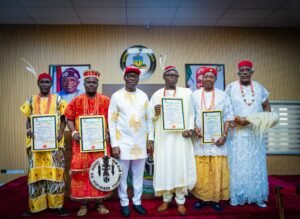
Governor Chukwuma Soludo’s presentation of certificates of recognition to four traditional rulers in Anambra State represents far more than a ceremonial gesture—it demonstrates a sophisticated approach to governance that harmonizes modern democratic principles with cherished cultural institutions.
The recognition of Igwe Chinonso Ezeokafor of Ikenga, Igwe Austine Chinedum Emelobe of Oba, Igwe Sunday Ozoemena of Ifite Anam, and Igwe Ifeanyi Okonkwo of Ichi showcases an administration deeply committed to inclusive leadership that respects both community autonomy and traditional heritage.
What makes Governor Soludo’s approach particularly commendable is his clear understanding that authentic leadership must emerge from the grassroots rather than be imposed from above. During the ceremony, he emphasized that “the power bestowed upon you is not granted by the Governor, but rather conferred by your communities,” reflecting a mature democratic philosophy that honors local consent and community-based governance. This perspective not only strengthens the legitimacy of traditional institutions but also reinforces democratic values at the most fundamental level of society.
The governor’s strategic vision extends beyond mere recognition to encompass a broader mission of moral and social transformation. His charge to these traditional rulers to “engage our youth” and champion “a rebirth of ethics and values” addresses one of Nigeria’s most pressing challenges with remarkable insight. By positioning these respected cultural figures as “the conscience of your communities,” Soludo has created a powerful framework for addressing youth disorientation and moral decay through trusted, culturally relevant leadership. His call for them to “lead by example, so that the youth can look up to you and say, ‘This is who we are,'” demonstrates an understanding of how cultural identity and moral guidance can be effectively transmitted across generations.
Soludo’s consistent practice of formally recognizing traditional rulers shows his commitment to inclusive governance, with this ceremony marking another milestone in his ongoing efforts to strengthen traditional institutions. Having previously recognized other monarchs in 2023 and early 2025, the Governor has established a pattern of sustained commitment that transcends political opportunism. This consistency is further reinforced by Commissioner Tony-Collins Nwabunwanne’s confirmation that these rulers “passed through a smooth process” and received “the new traditional rulers’ law for their review and understanding,” indicating that the administration has developed transparent, systematic procedures that ensure legitimacy while preventing arbitrary appointments.
The effectiveness of this collaborative approach is perhaps best illustrated by the reciprocal respect that has developed between the Soludo administration and traditional institutions. The recent conferment of the “Oluatu-egwu I” title on Governor Soludo by Anambra North Traditional Leaders Council demonstrates this growing mutual respect, suggesting that his administration has successfully built bridges between modern governance structures and traditional authority systems. This relationship-building has created a collaborative framework where both institutions can work together more effectively for community development.
The impact of these reforms is already being felt at the community level, as evidenced by Igwe Sunday Ozoemena’s heartfelt testimony during the ceremony. His praise for the Governor’s “diligent work” and acknowledgment that “the Council has been reformed and has become more effective” provides direct evidence of positive transformation. Moreover, his commitment that “our responsibilities are significant, and we will fully embrace ownership of what we have been entrusted with” reflects the seriousness with which these traditional leaders are approaching their enhanced roles under Soludo’s leadership.
The high-level government representation at the ceremony, including Secretary to the State Government Prof. Solo Chukwulobelu, Chief of Staff Ernest Ezeajughi, Principal Secretary Barr. Joachin Anaeto, and other key officials, underscores the central importance the administration places on traditional governance. This is not peripheral window-dressing but a core component of the state’s comprehensive governance strategy, demonstrating that Soludo’s continued recognition of traditional rulers into 2025 shows sustained commitment to this initiative as a fundamental policy priority rather than a temporary political gesture.
Through this thoughtful integration of traditional and modern governance structures, Governor Soludo has positioned himself as a visionary leader who recognizes that sustainable development requires both technological advancement and cultural continuity. His administration’s approach to traditional ruler recognition creates a model that other states could emulate—one that respects democratic principles while honoring cultural heritage, addresses contemporary challenges while drawing on traditional wisdom, and builds institutional strength while maintaining community authenticity. By successfully balancing these seemingly competing demands, Soludo is establishing a foundation for long-term social cohesion and sustainable development that could transform not just Anambra State but serve as an exemplar for governance across Nigeria.



